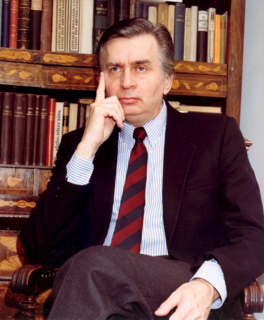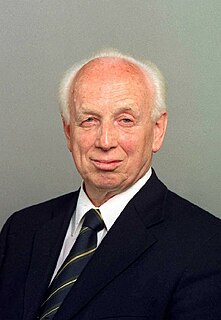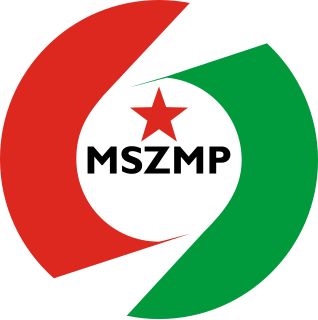
The National Assembly is the parliament of Hungary. The unicameral body consists of 199 members elected to 4-year terms. Election of members is based on a complex system involving both area and list election; parties must win at least 5% of the popular vote in order to enter the list of members of the assembly. The Assembly includes 25 standing committees to debate and report on introduced bills and to supervise the activities of the ministers. The Constitutional Court of Hungary has the right to challenge legislation on the grounds of constitutionality. The assembly has met in the Hungarian Parliament Building in Budapest since 1902.

József Antall Jr. was a Hungarian teacher, librarian, historian, and statesman who served as the first democratically elected Prime Minister of Hungary, holding office from May 1990 until his death in December 1993. He was also the leader of the Hungarian Democratic Forum from 1989.
The Alliance of Free Democrats – Hungarian Liberal Party was a liberal political party in Hungary.

The Hungarian Democratic Forum was a centre-right political party in Hungary. It had a Hungarian nationalist, national-conservative and christian democratic ideology. The party was represented continuously in the National Assembly from the restoration of democracy in 1990 until 2010. It was dissolved on 8 April 2011.

Péter Boross is a Hungarian politician, former member of the Hungarian Democratic Forum (MDF), who served as Prime Minister of Hungary from December 1993 to July 1994. He assumed the position upon the death of his predecessor, József Antall, and held the office until his right-wing coalition was defeated in election by the Hungarian Socialist Party (MSZP), which was led by his successor Gyula Horn. Prior to his premiership, Boross functioned as Minister of Civilian Intelligence Services (1990) and Minister of the Interior (1990–1993). He was also a Member of Parliament from 1994 to 1998 and from 2006 to 2009.

The 1990 Hungarian parliamentary elections were held in Hungary on 25 March 1990, with a second round of voting taking place in all but five single member constituencies on 8 April. They were the first completely free and competitive elections to be held in the country since 1945, and only the second free elections in the country's history. The conservative, nationalist Hungarian Democratic Forum (MDF) beat the liberal and more internationalist Alliance of Free Democrats, which had spearheaded opposition to Communist rule in 1989, to become the largest party in parliament. The Hungarian Socialist Party, the former Communist party, suffered a crushing defeat, winning only 33 seats for fourth place.

Imre András Pozsgay was a Hungarian Communist politician who played a key role in Hungary's transition to democracy after 1988. He served as Minister of Culture (1976–1980), Minister of Education (1980–1982) and Minister of State (1988–1990). He was also a Member of Parliament from 1983 to 1994.
The Minister of Human Resources of Hungary is a member of the Hungarian cabinet and the head of the Ministry of Human Resources. The current minister of human resources is Miklós Kásler.
The Hungarian Constitution of 1949 was adopted on 20 August 1949 and heavily amended on 23 October 1989. The document was Hungary's first permanent written constitution, and until its replacement in 2011, the country was the only former Eastern Bloc nation that did not adopt an entirely new constitution after the fall of Communism. The Constitution of Hungary, adopted in 2011, declares the 1949 constitution to be invalid.

The Opposition in Hungary is the body of political parties represented in the parliament which are not a part of the government supported by the parliamentary majority.

An indirect presidential election was held in Hungary on 5–6 June 2000. The only candidate was legal scholar Ferenc Mádl, who was nominated formally by the FKGP, a coalition member of the first cabinet of Viktor Orbán, composing Fidesz, FKGP and MDF. The left-wing and the far-right (MIÉP) opposition parties did not nominee a candidate. After three rounds, Mádl was elected President of Hungary, taking the office on 4 August in that year.

Péter Ákos Bod is a Hungarian politician and economist, who served as Minister of Industry and Trade in the cabinet of József Antall from 1990 to 1991 then Governor of the Hungarian National Bank from 1991 to 1994, when he resigned under the pressure of the Socialist Gyula Horn cabinet. He was also a Member of Parliament for the Hungarian Democratic Forum (MDF) from 1990 until his resignation in 1991. In 1996, he joined the Hungarian Democratic People's Party (MDNP) and was elected to its leadership.

















